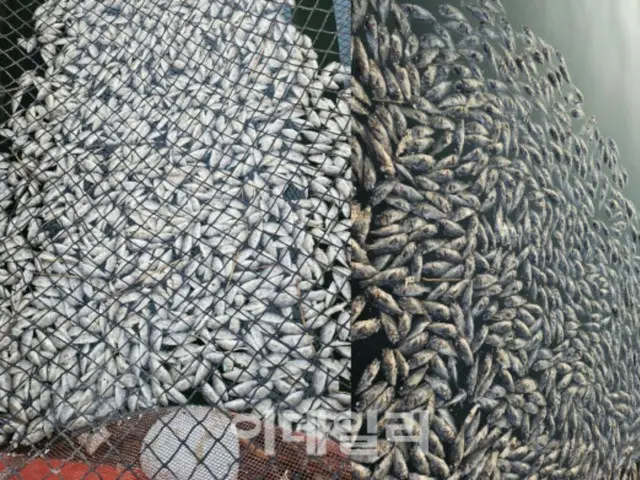"I really can't continue farming any more," lamented Mu JINHO (not his real name). On the 10th, Kim, who runs a 20,000m2 farm, said, "Today, I scooped up dead black rockfish fry.
"My farm is relatively small, so the damage was about 500 million won (about 53 million yen), but larger farms suffered damages of about 500 million won (about 53 million yen)," he said.
The damage will amount to several billion won. Taean County's aquaculture industry is promoting a "joint closure" due to the pessimistic outlook that serious damage caused by high sea temperatures will continue in the future.
This means that the fish farming companies in the Anmyeondo Marine Fish Farming Association will surrender their licenses and go out of business, an unprecedented move in South Korea.
Lee Jung-soo (not his real name), who attended the meeting, said, "The people who run fish farms in this town thought they would go out of business.
"Even if I take out insurance, I can only get 30 to 40 percent of the compensation, but the companies that didn't take out insurance because they thought the compensation rate would be low suffered huge damage."
In fact, the participation rate of fish farms in Taean County and elsewhere in the fish farming industry is only 34% as of this year. "The Korean government is providing support for damages, but it's not enough," said Lee.
"Rather than endure this kind of damage every year and accumulate debt, we have decided to return our licenses," he said. The fish farmers have informed the South Korean government of their intention to jointly close down their businesses and have also demanded compensation.
They claim that they need support from the Korean government because they were forced to close their businesses due to natural disasters that were beyond their control. However, in reality, there is no legal basis for them to be compensated for their business closure.
This is the reality. This is also the reason why the Ministry of Oceans and Fisheries is reluctant to comply with the demands of the businesses. In response, Rep. Song Il-jeong said that the government should provide financial support to fish farms that are forced to close due to damage caused by high sea temperatures.
"There is little chance that the deaths of farmed fish due to climate change will decrease in the future," said a member of the Diet's office.
"Through this revision, we are trying to give businesses that are finding it difficult to continue aquaculture greater options by providing them with assistance for going out of business," he said.
The South Korean government is preparing other measures to deal with the damage caused to fish farmers.
In addition, 13.9 billion won (approximately 1.47 billion yen) in disaster relief funds will be provided to 352 locations, including Chungcheongnam-do, Gyeongsangnam-do, and Jeollanam-do, where damage surveys and local government recovery plans have been completed.
The budget for next year has been increased to strengthen the competitiveness of the aquaculture industry.
The budget for aquaculture has been increased to 36.9 billion won (approximately 3.91 billion yen) this year, including support for smart and automated facilities by type and the development of environmentally friendly aquaculture that supports facilities that respond to climate change.
The ministry plans to increase the budget from the current 2017 budget of 100 million won (approximately 5.17 billion yen) to 48.8 billion won (approximately 5.17 billion yen) next fiscal year.
"We are aware of the need to prepare measures to respond to changes in ocean temperature in the medium to long term," he said.
Still, fish farmers are wondering, "What should we do next year and the year after?"
"Why did I decide to take over the family business and become a fish farmer?" Lee said. "If fish farms go out of business like this, the price of fish will eventually have to go up. The South Korean government
"I ask the public to understand our difficulties."
2024/09/11 07:11 KST
Copyrights(C) Edaily wowkorea.jp 107

